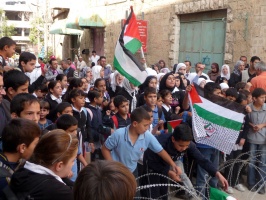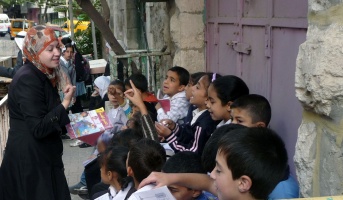Harsh living conditions in Hebron: Checkpoints limit right to education
Latest Topics
17، Apr 2024
Palestinian Human Rights Organisations on Israel’s Arbitrary Arrests, Enforced Disappearance, Inhumane Treatment, and Torture of Palestinians
16، Apr 2024
Action Alert: Al-Haq, Al Mezan and PCHR Urge the International Community to Intervene as Israeli Forces and Settler Violence Intensifies Across the West Bank
13، Apr 2024
Legal Position: United Nations Security Council Resolution 2728 Demanding a Ceasefire in Gaza is Legally Binding
13، Apr 2024
Palestinian Human Rights Organizations and ECCHR Sue to Stop German Weapons Exports to Israel
09، Apr 2024
PHROC Calls on Remaining Third States to immediately and Urgently Fund UNRWA to Prevent Famine and the Genocidal Destruction of the Palestinian People
08، Apr 2024
Deadly Attack on World Central Kitchen Team Exemplifies Israel’s Policy of Targeting Humanitarian Relief Operations in Gaza Amid the Ongoing Genocide
Related Subjects
12، Oct 2019
Over 280 ESCR-Net Members Call for Stronger Treaty to Regulate Corporate Activities
09، Oct 2019
Al-Haq’s Engagement with the UN Committee on Economic, Social and Cultural Rights for Israel’s Fourth Periodic Review
08، Oct 2019
Al-Haq Welcomes Launch of World Health Organization Report on the Right to Health in the Occupied Palestinian Territory



 In a recent infringement of the right to education, teachers from Qurtuba Primary School were given orders by the Israeli soldiers, manning the checkpoint at the northern entrance of al-Shuhada’ street, that they must pass through a metal detector in order to enter the area and gain access to the school. The orders applied to everyone, even pregnant women and people suffering from health conditions that can be exacerbated by the metal detectors.
In a recent infringement of the right to education, teachers from Qurtuba Primary School were given orders by the Israeli soldiers, manning the checkpoint at the northern entrance of al-Shuhada’ street, that they must pass through a metal detector in order to enter the area and gain access to the school. The orders applied to everyone, even pregnant women and people suffering from health conditions that can be exacerbated by the metal detectors.